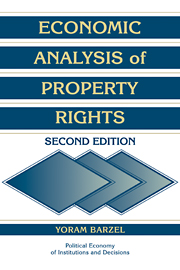Crossref Citations
This Book has been
cited by the following publications. This list is generated based on data provided by Crossref.
Razzaz, Omar M.
1996.
Amman.
p.
499.
Nerlove, Marc
1996.
Agricultural Markets.
Vol. 234,
Issue. ,
p.
9.
Thorne, Emanuel D.
1998.
The Shortage in Market‐Inalienable Human Organs: A Consideration of “Nonmarket” Failures.
The American Journal of Economics and Sociology,
Vol. 57,
Issue. 3,
p.
247.
King, Mary C.
1999.
Keeping People in Their Place: An Exploratory Analysis of the Role of Violence in the Maintenance of "Property Rights" in Race and Gender Privileges in the United States.
Review of Radical Political Economics,
Vol. 31,
Issue. 3,
p.
1.
Sørensen, Aage B.
1999.
Employment Relations and Class Structure.
The Sociological Review,
Vol. 47,
Issue. 2_suppl,
p.
16.
Kroszner, Randall S.
1999.
Can the Financial Markets Privately Regulate Risk? The Development of Derivatives Clearing Houses and Recent Over-the-Counter Innovations.
SSRN Electronic Journal,
Kang, David L.
and
Sørensen, Aage B.
1999.
OWNERSHIP ORGANIZATION AND FIRM PERFORMANCE.
Annual Review of Sociology,
Vol. 25,
Issue. 1,
p.
121.
Allen, Douglas W.
and
Lueck, Dean
2000.
A Transaction Cost Primer on Farm Organization.
Canadian Journal of Agricultural Economics/Revue canadienne d'agroeconomie,
Vol. 48,
Issue. 4,
p.
643.
Hampicke, Ulrich
2000.
Innovative Ansätze zum Schutz der Natur.
p.
127.
Thorne, Emanuel D.
2000.
The Economics of Reciprocity, Giving and Altruism.
p.
47.
Zhang, Yaoqi
2000.
World Forests from Deforestation to Transition?.
Vol. 2,
Issue. ,
p.
41.
Foss, Kirsten
and
Foss, Nicolai J.
2000.
Theoretical isolation in contract theory: suppressing margins and entrepreneurship.
Journal of Economic Methodology,
Vol. 7,
Issue. 3,
p.
313.
Salmons, Roger
2000.
Tropospheric Ozone Abatement.
p.
151.
Johnson, Ronald N.
2000.
Declining Industries and the Persistence of Government Support Programs: The Quiet Decline of Gum Naval Stores Production in the United States.
The Journal of Economic History,
Vol. 60,
Issue. 4,
p.
995.
Polischuk, Leonid
and
Savvateev, Alexei
2001.
Spontaneous (non) Emergence of Property Rights.
SSRN Electronic Journal ,
Zhang, Yaoqi
2001.
World Forests, Markets and Policies.
Vol. 3,
Issue. ,
p.
353.
Foss, Kirsten
and
Foss, Nicolai
2001.
Assets, Attributes and Ownership.
International Journal of the Economics of Business,
Vol. 8,
Issue. 1,
p.
19.
Sørensen, Aage B.
2001.
Sourcebook of Labor Markets.
p.
295.
Dapena, José Pablo
2001.
On the Property of Real Options and the Assets that Give Rise to Them.
SSRN Electronic Journal,
Peña, Sergio
2002.
Land use planning on the U.S.‐Mexico border: A comparison of the legal framework.
Journal of Borderlands Studies,
Vol. 17,
Issue. 1,
p.
1.



